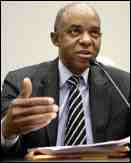Congressman William Jefferson Indicted on 16 Counts
/From the Congressional Quartlery [HERE]
By Susan Ferrechio 
- Democrats Fear a Wider Black Caucus-Pelosi Rift [MORE]
A federal grand jury on Monday handed up an indictment accusing Rep. William J. Jefferson of accepting bribes in exchange for helping put together telecommunications deals in Africa.
The grand jury in Alexandria, Va., declared that there are grounds to try the Louisiana Democrat on 16 charges, including soliciting bribes, racketeering, money laundering, obstruction of justice, wire fraud, conspiracy and violations of the Foreign Corrupt Practices Act.
Jefferson has been under investigation for years, and won re-election in 2006 despite reports that FBI agents had found $90,000 in marked bills in the freezer of his home during a 2005 raid.
In September 2006, Vernon Jackson, former head of the telecom firm iGate, was sentenced to 87 months in prison for trying to bribe Jefferson with more than $400,000 in hopes of landing contracts from the Army and a number of African nations.
As part of the probe, investigators allege that on July 30, 2005, they videotaped Jefferson receiving a briefcase containing $100,000 from an FBI informant. A few days later, the FBI executed search warrants to examine Jefferson’s homes and car, seizing a number of items, including $90,000 in marked bills from a freezer in his Washington home.
Jefferson, who maintains his innocence, was re-elected in November. He is fighting in court to retrieve documents seized by the FBI during a raid on his congressional office last year.
As the indictments were being announced, House Minority Leader John A. Boehner issued a statement warning that he intended to bring up a privileged resolution demanding that the ethics committee investigate whether Jefferson should be expelled.
The indictment will worsen Jefferson's political standing in Louisiana's 2nd District — a heavily Democratic and mostly African-American constiutency based in New Orleans that includes communities that were devastated by Hurricane Katrina two summers ago. It is highly likely he will either be vigorously challenged in a primary election next year, choose not to seek re-election or resign from office before then and force a special election.
Though the allegations of bribery were lodged before the 2006 election, Jefferson denied wrongdoing and said he deserved the presumption of innocence. He took 30 percent of the vote to finish first in a November primary election, then won a ninth House term by defeating Democratic state Rep. Karen Carter, 57 percent to 43 percent, in a December runoff.
"It is unfortunate that the dark cloud surrounding Congressman Jefferson and his service to the 2nd Congressional District continues to blanket our people while we are still struggling to recover," Carter said in a statement Monday.
Cheron Brylski, whose public relations company released Carter's statement, told CQPolitics.com it would be premature to discuss a Carter congressional campaign. She said Carter is focused on seeking re-election to the state House this fall.
Democratic state Sen. Derrick Shepherd, who finished third to Jefferson and Carter in last year's primary, has designs on Louisiana's 2nd District. Shepherd endorsed Jefferson in last year’s runoff election, citing philosophical differences with Carter, though it was clear his thinking was influenced by how a Carter victory might have checked his own future congressional aspirations.











































































































































































































































































